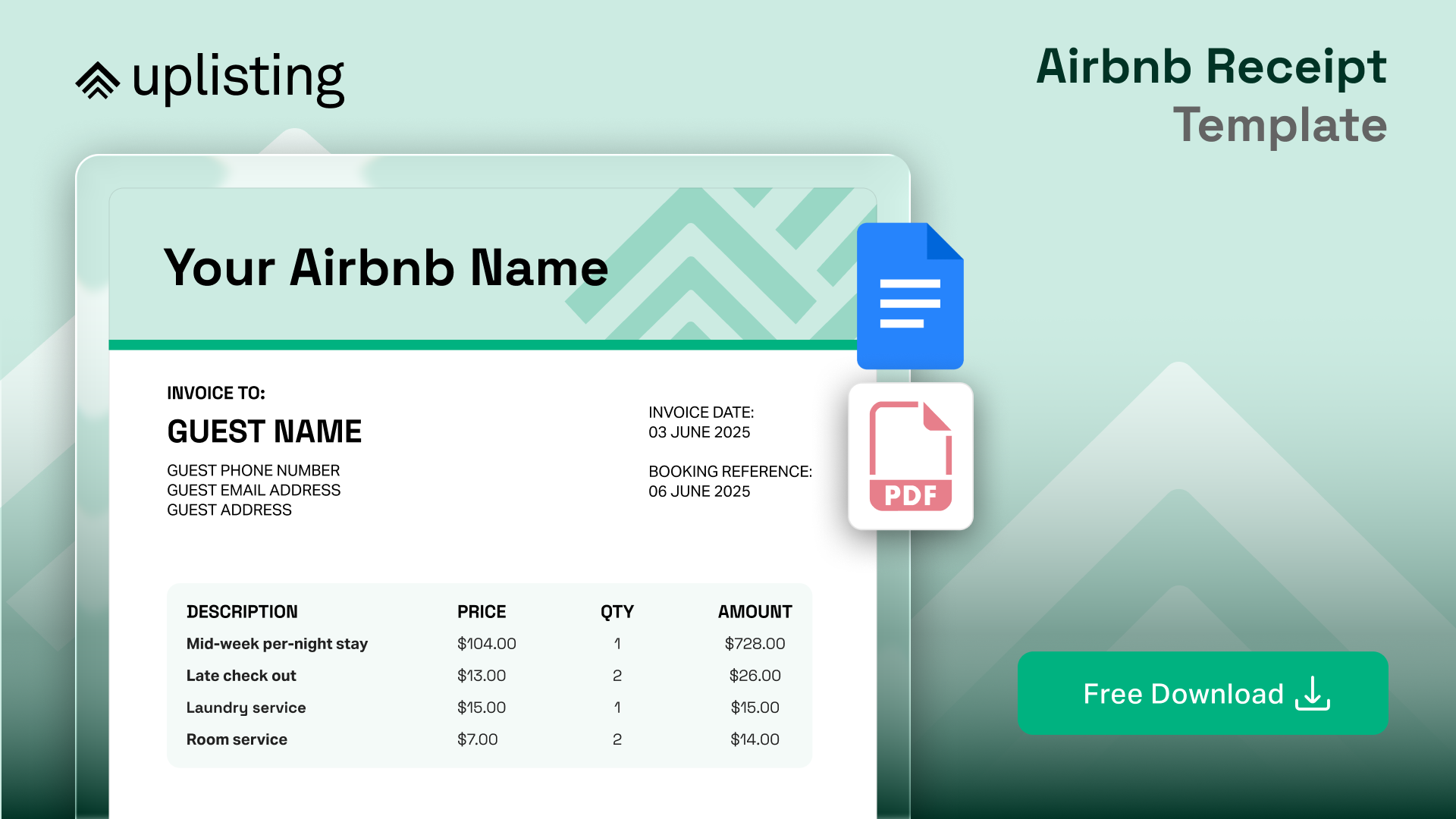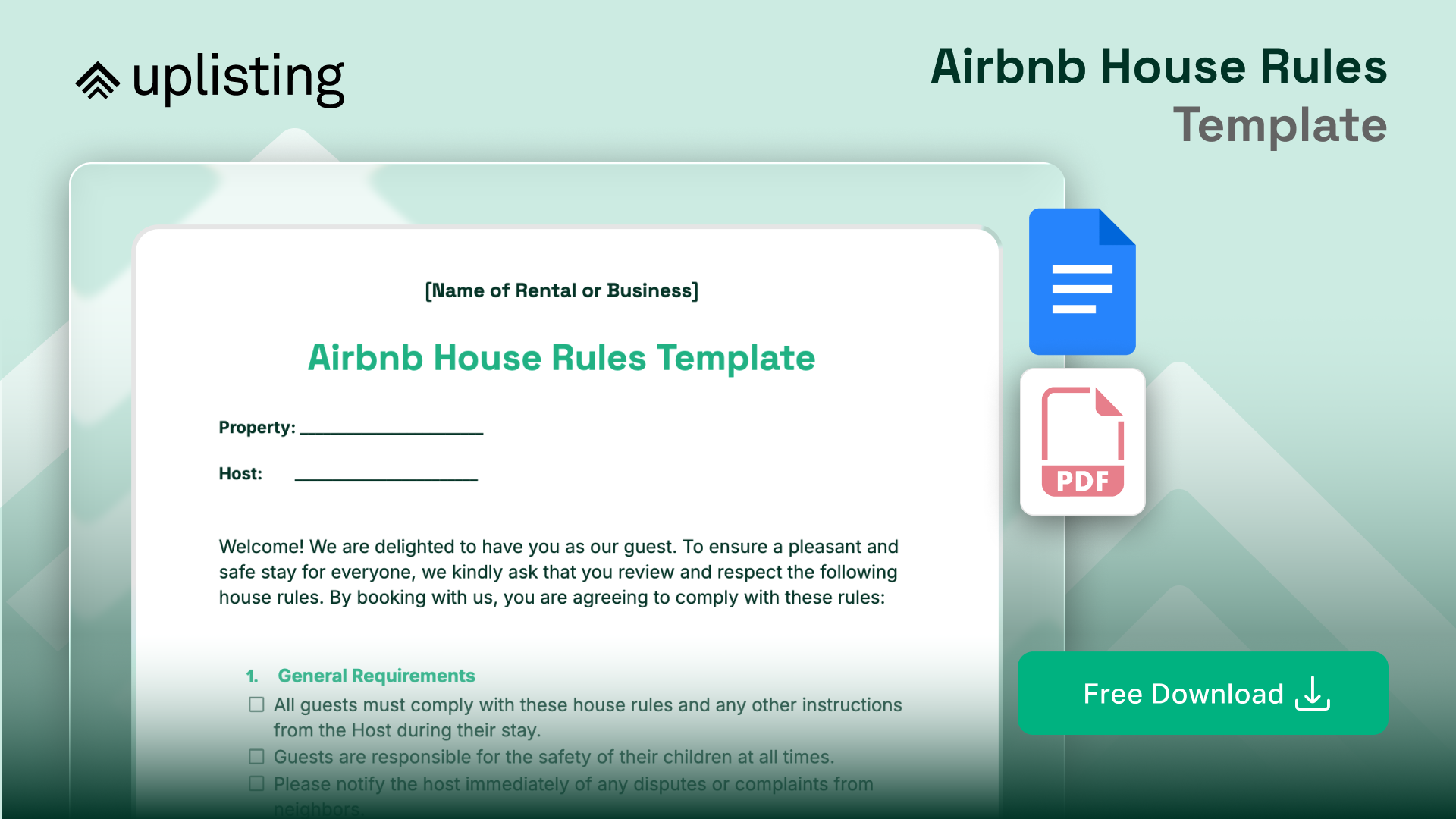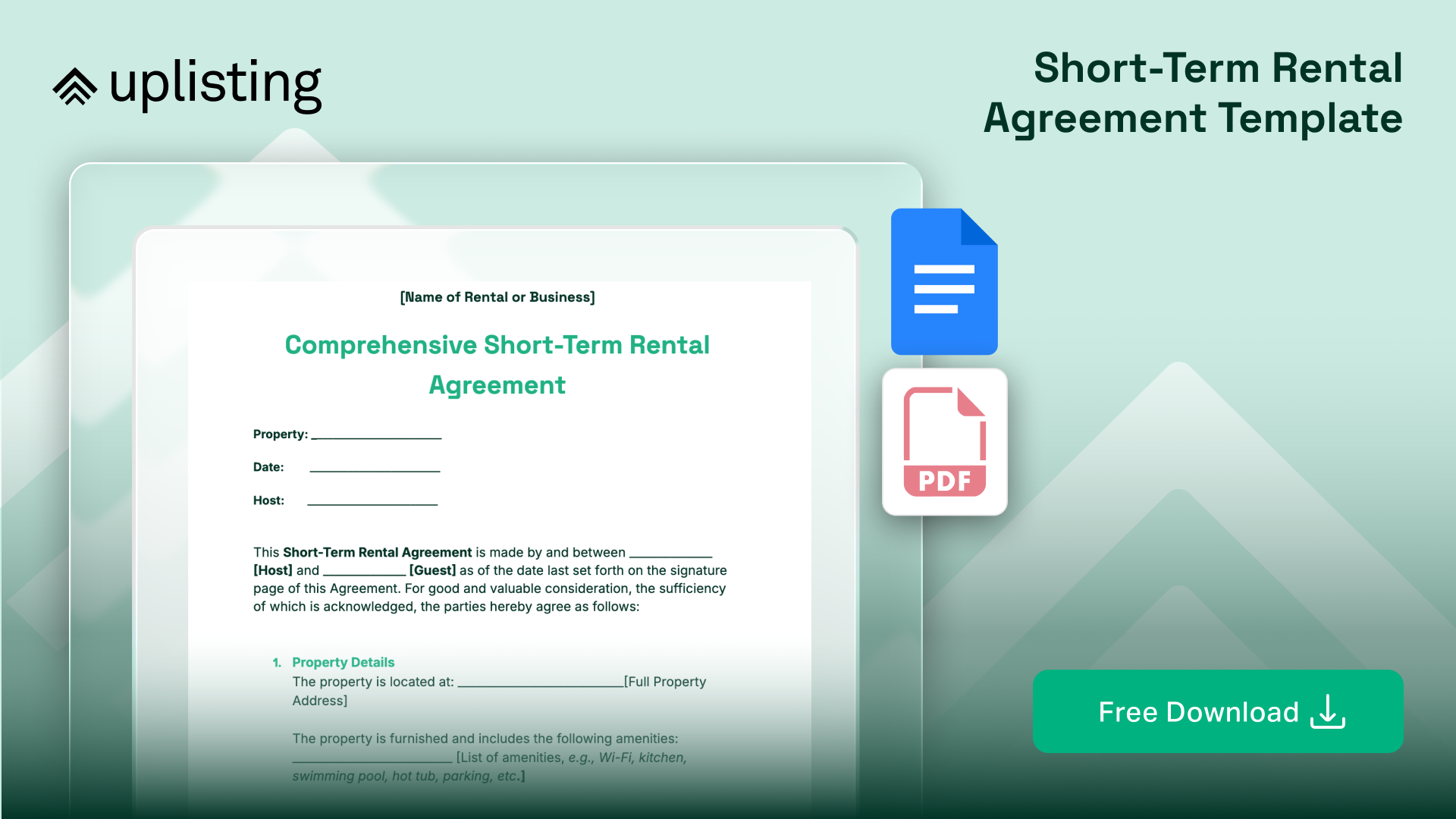Key Takeaways
Strategic revenue management boosts income per property without simply raising nightly rates.
Understanding demand trends, seasonality and your comp set ensures pricing stays competitive and profitable through slow and peak periods.
The most successful hosts rely on data-driven tools, dynamic pricing and automation to adapt quickly and maximize revenue across multiple listings.
Gone are the days when Airbnb success meant setting a flat nightly rate and hoping for the best. Today’s top hosts think like hotel managers, studying demand, tracking trends, and letting data drive every pricing decision.
But here’s the good news: you don’t need a degree in hospitality management to boost your earnings. With the right setup, some strategic rental analytics on your side and a few smart automations, you can price like a pro, fill your calendar, and maximize profit from every booking.
In this article, we’ll break down how real hosts master Airbnb revenue management, and how you can use tools like Uplisting to take the guesswork out of pricing once and for all.
What Airbnb Revenue Management Actually Means
Revenue management is the science of setting the right price for the right guest at the right time. For Airbnb hosts, it’s not about charging more, it’s about charging smarter.
The approach uses data, forecasting, and market analysis to help you get the highest value from every available night. Instead of relying on gut instinct or last year’s averages, you’re watching demand signals, revisiting your comp set, and studying guest behavior to set prices that match the moment.
Where many hosts simply adjust rates by season or gut feeling, revenue management combines data, timing, and guest behavior to make every night count.
Hotels have been doing this for decades, constantly tweaking prices based on occupancy forecasts, event calendars, and booking pace. The same approach now powers the most successful Airbnb listings. Whether you’re managing one home or ten, using these principles can help you stay competitive without working around the clock.
All-in-one Vacation Rental Software and Channel Management System
Get started in seconds by connecting Airbnb
Manage short-term rentals & bookings, message guests, take payment, and so much more. All in one easy-to-use platform (that never double-books).
The Key Metrics Every Host Should Know
Airbnb revenue management isn’t about chasing higher booking counts or hoping for better rates.
Top hosts focus on the numbers that actually drive profit across every property in the portfolio. When you track the right data, you spot issues early and make decisions that keep stakeholders satisfied and returns growing.
These five metrics form the foundation of any strong revenue strategy.
1. ADR (average daily rate)
Average daily rate, or ADR, shows what you earn per night booked, not just the price on the listing.
ADR reflects real discounts, service fees, and platform quirks, so you get a clear sense of your nightly take-home. If you see ADR dropping, you might be discounting too heavily. When ADR rises, check that occupancy isn’t slipping. The right balance means you’re getting paid what your property is worth.
2. Occupancy rate
Occupancy rate measures how many available nights end up filled with bookings.
High occupancy can look impressive, but it sometimes signals underpricing, especially if every week fills up without effort. If you notice occupancy dropping, you might need to review pricing, photos, or guest experience details. Consistent, healthy occupancy means your pricing and marketing strategy are on target.
3. RevPAR (revenue per available rental)
Revenue per available rental, or RevPAR, combines ADR and occupancy into one practical number. RevPAR answers a simple question: “How much income does each night on the calendar bring in, whether booked or not?” If RevPAR dips, you know there’s a problem—maybe rates are too low, or nights aren’t getting filled. RevPAR gives a real pulse check on profitability, not just activity.
4. LOS (length of stay)
Length of stay, or LOS, tracks how many nights the average reservation lasts.
Longer bookings cut down on cleaning costs and gaps between guests, but can sometimes block higher-paying short stays or reduce flexibility for last-minute demand. Scalers watch LOS to make sure they’re not trading away premium bookings for convenience.
5. Cancellation rate
Cancellation rate quietly erodes profit and efficiency.
High cancellation numbers waste admin time, create hard-to-fill gaps, and frustrate everyone involved. Rising cancellation rates can also push listings down in search results and hurt guest trust.
Savvy hosts don’t shrug off cancellations, instead they spot patterns and adjust policies or communication to prevent repeat issues.
How Smart Hosts Set and Adjust Pricing
Revenue management isn’t about setting a number once and walking away. It’s about staying agile and letting data guide your decisions.
1. Embrace dynamic pricing (not guesswork)
Flat rates and crossed fingers don’t cut it anymore.
Data-driven hosts let dynamic pricing do the hard work, updating nightly rates every day in response to booking pace, seasonality, and local events. Property management software or integrated pricing tools make rate changes automatic, so you can skip the manual adjustments and keep your focus on operations. With rates matching demand, calendars fill up, and average daily rates climb without extra effort.
2. Track competitors, then go beyond them
Following the neighbor’s price leaves you one step behind. Real pros watch their comp set but go further by analyzing who actually wins bookings, what amenities attract guests, and how often others sit empty.
Highlight unique features and time price moves to scoop up demand when other listings miss out. Airbnb revenue management is about taking the lead, not blending in with the crowd.
3. Use minimum stays strategically
Minimum stay settings shape both occupancy and guest mix. A two-night minimum during busy weekends brings in higher-value bookings and eases turnover headaches, while single-night stays clear up awkward calendar gaps.
Tweak minimums for weekdays, weekends, or special occasions to strike a balance between income and operational sanity. Operators who review stay patterns regularly and adjust requirements find occupancy and revenue both improve.
4. Reward repeat guests
Returning guests are the easiest wins, lower marketing costs, smoother communication, and more reliable bookings.
Offer a small discount or a thoughtful touch for guests who book again, and you’ll see more direct reservations and positive word-of-mouth. Loyal guests help cushion slow periods and show you run a property worth coming back to.
Enjoy the confidence & focus you need to scale your vacation rental business
Book more while doing less
With a reliable VRM solution you can trust, Uplisting can help you grow your business without wasting time on double bookings, unhappy guests, upset clients and worrying what could go wrong next.
The Power of Seasonality and Local Events
Every market beats to its own rhythm. Ignoring seasonality and local events means cash slips through your fingers.
Seasonality shows up as clear peaks and valleys, beach towns buzz in July, ski cabins fill up in January, and city apartments slow down when schools start. Spotting these cycles of peak- and off seasons comes from digging into your own monthly booking data, comparing year-over-year trends, and talking with other hosts in your area.
Once you know the patterns, adjust rates, minimum stays, and advance booking windows to match demand.
September often drags? Drop your minimum stay or introduce last-minute specials to nudge occupancy up. When you see high season coming, raise rates ahead of the rush and tighten up cancellation rules to protect your best dates. Airbnb revenue management rewards early moves: open premium nights to eager bookers long before last-minute bargain hunters arrive.
Local events turn an average week into your best earner.
Scan city calendars for concerts, conventions, or sports tournaments, and set reminders for new announcements. Update pricing as far out as possible for big events, using higher minimum stays or special fees to capture the surge.
Even small adjustments can pay off. Shift check-in by a single day for a business conference or extend availability for a marathon, and you might see a 20–30 percent boost in nightly rates compared to leaving your calendar untouched. Catching demand before guests even start searching is where hosts separate from the pack.
That’s how you lead the market, not just fill your calendar.

Automating Your Revenue Strategy
The smartest hosts don’t spend hours glued to spreadsheets, they let automation handle the heavy lifting.
1. Syncing pricing across channels
Juggling prices on Airbnb, Booking.com, Vrbo, and direct booking sites eats away at your time.
Modern property management software syncs rates instantly on every channel, so you stay in control as your calendar changes. When you adjust a nightly price or add fees, like security deposits, cleaning, or linen charges, the updates appear everywhere guests book. You avoid double bookings, keep pricing consistent, and never race to fix a mistake after a last-minute change.
Automation takes care of repetitive updates, freeing you up to focus on scaling your portfolio and running a tighter operation.
2. Instant rule adjustments
Fast-moving markets keep everyone on their toes. With the right platform, you set rules for minimum stays, last-minute discounts, or weekend surges in a few clicks.
Want a two-night minimum during peak weekends and single nights midweek? Easy. Offer a non-refundable rate for last-minute guests, or drop a flash discount when occupancy slides? Just tweak the rules once, then roll them out across every property.
As demand shifts or new events pop up, you only need a single adjustment to stay ahead of pricing trends. No more manual edits or wasted admin hours.
3. Analytics in real time
Nobody has time for guesswork when revenue is on the line. Real-time dashboards bring together revenue, occupancy, average daily rate, and booking trends so you see results as soon as they happen.
Top tools highlight underperforming properties, call out sudden booking drops, and show exactly where a quick rate change or new rule could boost your calendar. You get a clear read on your revenue strategy without crunching numbers by hand.
With up-to-date analytics, you spot patterns early and make decisions with confidence, no more surprises or chasing last month’s numbers.
So automatic, you won’t know what to do with yourself
Put my rentals on autopilot
It’s simple to automate repetitive tasks with Uplisting's short-term rental software. You’ll save hours every week and eliminate human error. Go ahead — take some time off.
Common Pricing Mistakes That Cost Hosts Thousands
Plenty of hosts set rates and walk away, then wonder why calendars stay empty or profits miss the mark. The reality? Even experienced managers, especially when scaling, lose thousands by repeating a handful of classic errors.
Setting rates too high during low seasons
Rates left sky-high in the shoulder season turn properties into expensive paperweights. Travelers searching for value in shoulder periods skip over listings priced for summer crowds.
Smart hosts respond quickly when demand drops, adjusting prices by small amounts instead of holding out for a unicorn booking that never comes.
A difference of fifty dollars per night can mean the gap between a full week and another silent calendar.
Ignoring midweek opportunities
Weekend bookings tend to get all the focus, but midweek dates hold their own value, especially for business travelers, remote workers, and locals seeking a change of scenery.
Overlooking Tuesday or Wednesday slots creates gaps in revenue streams. Offering targeted discounts or dropping minimum stays for these nights pulls in guests who otherwise wouldn’t have booked, smoothing income and improving RevPAR across every property.
Forgetting to update cleaning fees or discounts
Cleaning costs and discounts shouldn’t stay static. Ignoring supply price changes or updates from local competitors drags down profit and can even scare off guests with outdated fees.
Regular reviews of cleaning charges and discount settings keep listings competitive and protect margins—vital when juggling multiple properties where small errors add up fast.
Failing to test new rate strategies regularly
Revenue management on Airbnb is an ongoing job, not a once-a-year chore. Hosts who experiment with non-refundable rates, early-bird deals, or last-minute price drops learn what actually works in their area. Refusing to test new pricing approaches makes listings invisible to the right guests and leaves hard-earned revenue behind.
Markets shift fast, and flexible pricing keeps income steady while others scramble to catch up.
Let the Data Do the Heavy Lifting
Gut feelings run out of steam fast, especially when a neighbor grabs every booking while your inbox stays quiet. Airbnb revenue management has evolved from a passive task into a strategic advantage.
Top hosts now rely on data, dynamic pricing, and automation to optimize every listing and respond quickly to shifts in demand. By tracking key metrics like average daily rate (ADR), revenue per available rental (RevPAR), and occupancy, they ensure every night on the calendar earns its full potential.
The real win comes from working smarter, not harder. With the right tools in place, pricing becomes proactive and not reactive. Property managers who embrace automation, stay ahead of local events, and analyze performance in real time don’t just survive in competitive markets... They lead them.
Ready to take control of your pricing strategy and scale with confidence? Sign up for Uplisting today and start letting the data do the heavy lifting.
Create 5-star guest experiences
Give your guests unforgettable experiences
With Uplisting, you can send the right messages at the right time on all booking sites. Read and respond to guest messages in a single, unified inbox — whether you’re at the office or on the go.
FAQs About Airbnb Revenue Management
Is hiring a revenue manager worth it?
Bringing a revenue manager onto the team pays off once a portfolio grows past six listings. With a skilled pro handling dynamic pricing, demand forecasting, and comp set analysis, daily rate decisions become sharper and missed revenue opportunities drop. Management fees often look small compared to the extra income from smarter, more responsive strategies.
How often should I adjust my rates?
Market conditions shift fast, so weekly rate reviews keep pricing competitive.
During busy seasons or when demand fluctuates, daily tweaks capture every surge and fill last-minute gaps. Automated pricing tools do the heavy lifting in real time, letting rates stay in sync with booking trends and local events without constant manual checks.
Can a property management system help me make more money?
A property management system (PMS) pulls calendars, guest messaging, and analytics into one dashboard, eliminating double bookings and cutting down on costly errors.
Faster updates and automated workflows mean less time fixing mistakes and more time focusing on growth.
Real-time insights highlight underperforming dates and flag opportunities for higher occupancy or stronger rates, helping operators squeeze every bit of value from Airbnb revenue management.

















.png)

